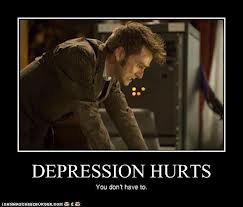Depression is an extremely serious illness. It is much more than feeling “down” or feeling “blue.” If you, or someone you know is suffering from major depression, it is likely that you understand just how debilitating this terrible illness is. A person who is depressed cannot “snap” out of their depression anymore than a person with Cancer can “snap” out of their Cancer. Recovering from depression almost always requires some form of professional help and assistance. The paragraphs of this article contain tips and advice to help treat depression. As hard as it may be to believe this, no matter how much you are currently hurting from depression, the feelings of despair and agony do not last forever. Read on to learn more.
The Secret of Why Depression Hurts
 If you are depressed to the point that it is affecting your ability to live a normal, functional life, if you experience uncontrolled crying spells or if you have suicidal thoughts, it is important that you talk to a doctor about your depression. Simply talking to someone about your feelings can help a great deal. A good therapist can help to develop a treatment plan for your depression. A psychiatrist can write you a prescription for anti-depressant medication. Depression can be either situational or chemical. If your depression is situational, meaning it was caused by stressful life events or changes, talk therapy without medications may be enough to resolve your depression. If your depression is chemical, it means that your brain chemistry is slightly off. The most effective way to restore normal brain chemistry and resolve this type of depression is by taking an anti-depressant medication. There are a wide range of anti-depressant medications available on the market; each one has different pluses and minuses, as well as different side effects. Anti-depressants take time to work, so do not expect to feel great after a few days. Be patient. Some people experiment with several different anti-depressants before they are eventually able to find one that works for them.
If you are depressed to the point that it is affecting your ability to live a normal, functional life, if you experience uncontrolled crying spells or if you have suicidal thoughts, it is important that you talk to a doctor about your depression. Simply talking to someone about your feelings can help a great deal. A good therapist can help to develop a treatment plan for your depression. A psychiatrist can write you a prescription for anti-depressant medication. Depression can be either situational or chemical. If your depression is situational, meaning it was caused by stressful life events or changes, talk therapy without medications may be enough to resolve your depression. If your depression is chemical, it means that your brain chemistry is slightly off. The most effective way to restore normal brain chemistry and resolve this type of depression is by taking an anti-depressant medication. There are a wide range of anti-depressant medications available on the market; each one has different pluses and minuses, as well as different side effects. Anti-depressants take time to work, so do not expect to feel great after a few days. Be patient. Some people experiment with several different anti-depressants before they are eventually able to find one that works for them.
Exercise frequently. Along with being great for your body’s physical health, exercise is great for your mental health. Exercise causes your body to release endorphins which naturally improve your mood. Engaging in regular exercise, both aerobic, such as walking or jogging, and anaerobic, such as lifting weights, can do wonders to alleviate your depression.
Eat a healthy, well-balanced diet. If you are depressed you want to avoid eating junk food. Although junk foods are comforting at the time, they will ultimately end up making you feel worse. High sugar foods can spike insulin levels and cause your energy levels to crash. Eat plenty of vegetables and fresh fruits along with whole grains and lean sources of protein. You may wish to take a daily multivitamin to ensure that your body is getting all of the nutrients that it needs.
Track Your Depression
Keep a journal. Recording a daily journal can help you deal with the thoughts and emotions you are dealing with. Writing can act as a form of release and help you to feel better about yourself. It is also useful to track your depression so that you can determine what treatments are and are not working.
Depression is a painful disease. No matter how bad things seem, never give up on yourself. Things can get better. Good luck!